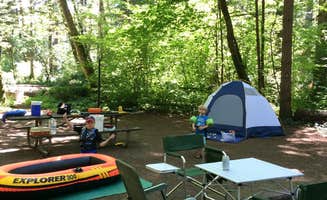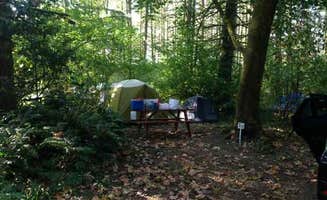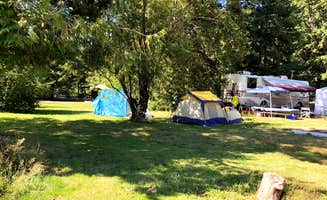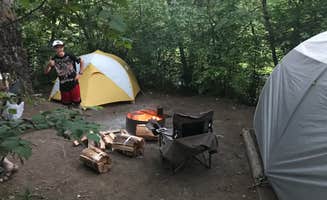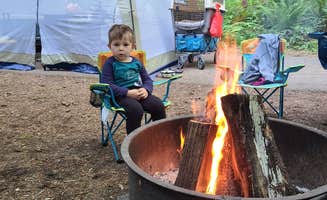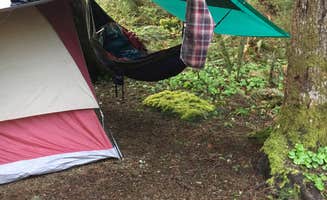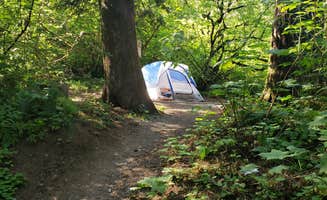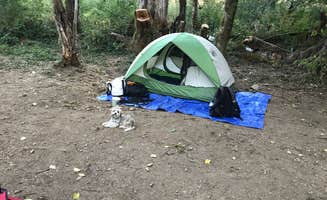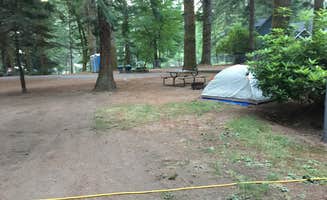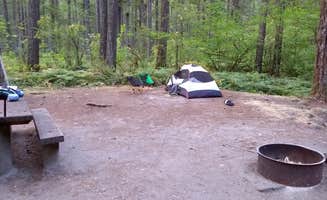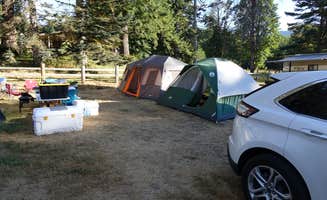Camping around Battle Ground, Washington centers on forested areas with elevations ranging from 500-700 feet, creating cooler overnight temperatures than nearby Portland. Summer temperatures typically reach 75-85°F during the day while dropping to 50-55°F at night, making sleeping bags rated for 40°F appropriate for most summer camping trips. Morning fog often settles in lower campsites near water bodies, particularly in spring and early fall.
What to do
Swimming at natural pools: At Sunset Falls Campground, visitors enjoy a short walk to multiple swimming areas. "The pools above the falls, jumps into the lower pool and the falls themselves are amazing, mostly after Noon when the sun comes onto the river," notes one camper, who also recommends timing visits carefully as "it was busy every day despite staying Sunday through Wednesday but it was hot and mid summer."
Fishing year-round: Battle Ground Lake State Park offers fishing throughout all seasons, even winter. A winter visitor reports, "Rolled in January 1st. Self pay. About 5 sites with power and water. We got a nice level one. There are only 5 other sites in the whole campground occupied. Short walk to the lake to fish. Beautiful and quiet... And 25 degrees." The volcanic lake is regularly stocked with trout, bass and bluegill.
Winter camping options: Unlike many Northwest campgrounds that close seasonally, several Battle Ground area campgrounds remain operational year-round. A camper at Oxbow Regional Park shared their winter experience: "Husband and I spent this past weekend camping in Oxbow Regional Park and thoroughly enjoyed it! Given it's late October and a bit chilly out, the campground was pretty quiet with only a few other campers around."
What campers like
Walk-in sites for privacy: Several campgrounds offer walk-in tent sites that require a short hike from parking areas. At Sunset Falls Campground, "Site #11 is a walk-in site that offers the most seclusion in the campground. You are away from all other campers and surrounded by river and trees." Similarly, visitors note that some walk-in sites have "lots of privacy" despite being "a very short walk from the parking lot."
Year-round accessibility: The region allows for camping in all seasons with appropriate preparation. As one Bayport RV Park camper explains, "Most sites have water year round except the center ones," making it feasible for winter camping trips when many other Northwest facilities close completely.
Affordability of primitive sites: Basic campgrounds without full amenities offer significantly lower rates. One camper reports, "When we were there it was $12 for a campsite" at Sunset Falls, while another mentions bringing "exact change in cash" as payment is often self-service at smaller Forest Service campgrounds in the area, especially during off-peak seasons.
What you should know
Bathroom quality varies widely: Facilities range from well-maintained to problematic. At Lewis River Campground, a visitor warned, "The camp host is 5 STARS...doing the best he can with what he has to work with. Which is a very old network of 3 bathroom facilities that are beyond gross despite best efforts. It is mostly about the age of the structures."
Water quality concerns: Some campgrounds have water issues. A camper at Bayport RV Park noted, "Water pressure is the lowest we've ever experienced. Not sure what's going on but all of the folks we've talked to are experiencing the same." At another facility, campers reported that "The water has arsenic and is no good to drink or cook with. You have to bring your own water, or buy theirs."
Road and traffic noise: Several campgrounds are close to busy roads or highways. At Paradise Point State Park, "Freeway is really really close to the whole camp site. You can hear vehicles at night. If you're a light sleeper or need nature noises when camping - this is not the site for you."
Tips for camping with families
Kid-friendly swimming areas: Paradise Point State Park offers swimming access designed with children in mind. "The day use area also provides life jackets if you forget yours," notes one visitor. Another mentions that "The river was shallow and dropped to the deep end. It was ideal for children because the shallow end stretched a bit and the deeper end was the other side."
Off-season benefits: Less crowded campgrounds offer a more relaxed experience with children. At Battle Ground Lake, a winter visitor found "only 5 other sites in the whole campground occupied," making it easier to manage children without disturbing other campers.
Rainy day alternatives: When camping near Battle Ground, prepare for wet weather with nearby indoor options. A Bayport RV Park visitor noted its location advantage: "There's the convenience of being minutes away from a few little cities, and 30-40 minutes out of Portland-proper, so you're definitely able to get almost anything you might need; service, retail, eatery, etc, super conveniently!"
Tips from RVers
Site selection strategy: At many of the best places to camp near Battle Ground, Washington, RV site selection makes a significant difference. At Portland Fairview RV Park, "The spaces are pre-assigned but very tight. We unfortunately didn't get a pull-through site even though quite a few were available." For Paradise Point, an RVer warns: "We put the size of our RV in the state website and it gave us site 50. We arrived and it was IMPOSSIBLE to get our rig in that site due to the trees."
Water and power availability: Battle Ground area RV parks offer varying hookup options. At Columbia River RV Park, an RVer shared: "About as close-in Portland as you can get for an RV park... not really much to do in this area or in the park itself, but if you're passing through Portland and need a place to stay you could do much worse." Several parks offer only partial hookups, with one camper noting, "Not sure where a local dump station might be..."
Seasonal site changes: Winter camping requires additional planning for RVs. At Battle Ground Lake State Park, a January camper found "about 5 sites with power and water" remained operational, a significant reduction from summer capacity. Reserving these limited winter sites becomes essential for cold-weather RV trips.


